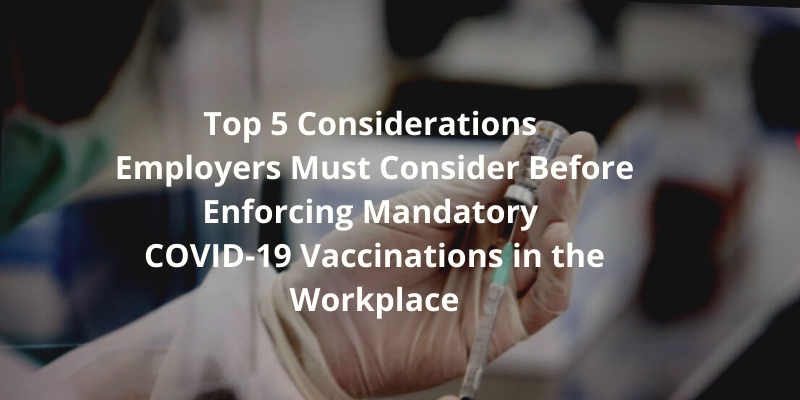COVID-19 Vaccinations in the Workplace: Top 5 Considerations for Employers
31 Jan 2023
10 Sep 2021
min read

To protect its residents against COVID-19, many governments around the world have implemented vaccination programmes, making vaccines easily accessible to the public. Employers may also consider enforcing mandatory COVID-19 vaccinations to maintain health and safety in the workplace.
-
Is it legal for employers to enforce mandatory vaccinations?
Under common law, employers have a legal obligation to take reasonable care of the health and safety of their employees. Employers must consider whether it is ‘reasonable’ to require employees to take vaccinations to ensure health and safety in the workplace.
Rather than imposing mandatory vaccinations, employers can provide lawful and reasonable directions for employees to get vaccinated. To determine whether a direction is lawful, employers can refer to the employment agreement to see if there are express or implied terms enabling them to implement measures to protect health and safety in the workplace. While a direction may be deemed reasonable after looking at the facts in relation to the employment agreement, the nature of work and relevant legislation, employers should refer to local laws to ensure that mandatory vaccinations are not discriminatory.
-
What can employers do if employees refuse to take the vaccinations?
Employers may offer incentives to encourage employees to get vaccinated, such as cash rewards, coupons, and paid leave.
If employees ask to be exempted from taking the vaccinations due to medical reasons, religious purposes, or disabilities, employers may require them to work remotely.
Employers can require regular COVID-19 testing for employees who refuse the vaccine due to other unsupported reasons. This type of mandate has been implemented by employers in places such as New York and Hong Kong.

-
Can employers require potential employees to get the vaccine before starting work?
There is no legal prohibition on employers requiring potential employees to be vaccinated before starting work. Employers can make conditional offers of employment if vaccination is a condition for being hired. They may also add reasonable terms to the employment contract of new employees. However, employers should consider employment protections and anti-discrimination laws before implementing this rule.
-
Is it discriminatory for employers to dismiss employees who refuse to get vaccinated?
Employers can require all employees who return to the workplace to take vaccinations, subject to the anti-discrimination laws in the jurisdiction where the work is conducted. If employers decide to implement mandatory vaccinations, they should make sure that they do not discriminate against employees based on the grounds of age, sex, race, etc.
Importantly, employers should note that employees who refuse to get vaccinated due to medical reasons, religious purposes or disabilities may be exempted from mandatory vaccination. It is recommended that employers ask for supporting documentation or evidence. Employers must consider data protection issues and comply with local rules and regulations when collecting, retaining, processing, and transferring employees' personal data.
If employers are concerned about health and safety in the workplace, they can arrange for such employees to work from home or take a leave of absence, instead of dismissing employees, which could lead to potential claims of wrongful, unreasonable, and unlawful dismissal.
For more information, employers may refer to the following legislations or acts in their respective jurisdictions:
|
Jurisdiction |
Relevant Legislation/Act |
|
Australia |
|
|
Canada |
|
|
Hong Kong |
|
|
Singapore |
|
|
New Zealand |
|
|
United Kingdom |
|
-
Can employers be liable for serious adverse reactions, illnesses, or death of employees due to taking mandated vaccinations?
Employers may be negligent if employees suffer serious adverse reactions, illnesses, or death after taking mandatory COVID-19 vaccinations, depending on the laws in the jurisdiction where the work is conducted.
Liability may arise if the vaccine was taken during the course of the employee’s employment. For example, if an employee is involved in an accident that causes injury on the way to or from the vaccination venue during work hours. To determine whether employers are liable, factors such as the workplace, the employee’s work hours, and whether the employee was acting in the employer’s interest or their own interest, will be considered.
Employers must consider the risk of employee compensation claims if employees suffer serious adverse reactions, illnesses, or death after taking mandated vaccines.
-
Can employers require employees to produce proof of whether they have been vaccinated?
Employers that require vaccination may also require vaccination proof. However, such proof of vaccination may be considered medical information. In many jurisdictions, any data relating to employees' health may constitute sensitive/personal data. Therefore, the employer should comply with local laws relating to personal data when collecting, retaining, processing, and transferring the personal data of employees.
When making a decision as to whether to enforce mandatory COVID-19 vaccinations in the workplace, employers should monitor new developments in relevant local laws, government rules and regulations and court decisions.
Please note that this is a general summary of the position under common law and does not constitute legal advice. As the laws of each jurisdiction may be different, you may wish to consult your lawyer.
Keywords:
